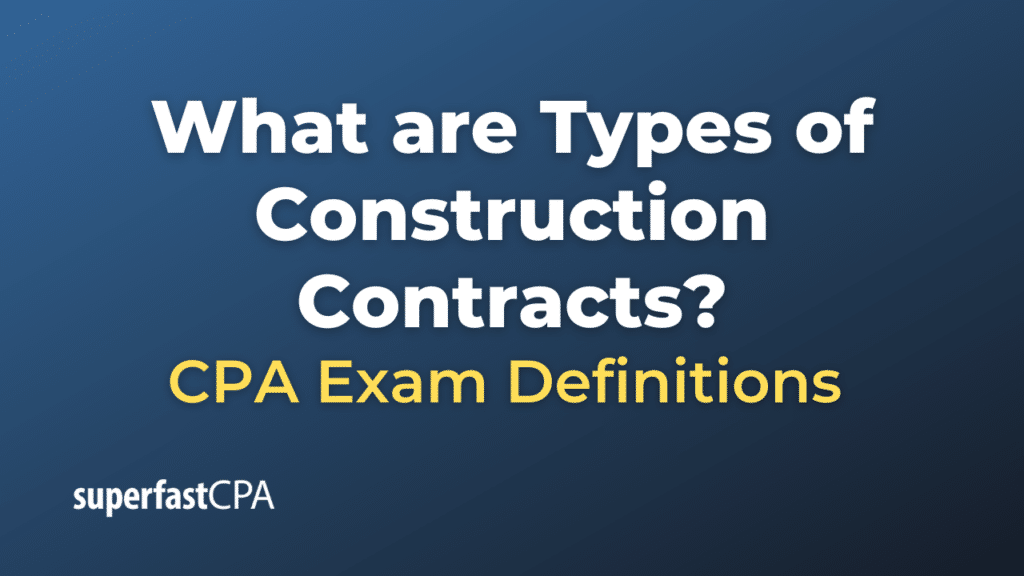Types of Construction Contracts
Construction contracts define the terms of agreement between the parties involved in the construction process, primarily the owner or client and the contractor. They set out the scope of work, the price or method of payment, the timeline, and other terms and conditions. There are various types of construction contracts, and the choice of contract often depends on the project’s size, complexity, and the preferences of the involved parties.
Here are some common types of construction contracts:
- Lump Sum or Fixed Price Contract:
- The contractor agrees to perform the work for a fixed sum of money. It’s beneficial for projects with a well-defined scope or when the risks are well understood.
- The risk of cost overruns is borne by the contractor.
- Cost Plus Contract:
- The owner agrees to cover the actual costs of construction plus a fee (either a fixed amount or a percentage of costs) to the contractor. This type of contract is used when the project scope is not well-defined.
- The risk of cost overruns is typically borne by the owner.
- Unit Price Contract:
- The owner agrees to pay the contractor a specified rate per unit of work. This type of contract is common for projects where the amount of work is unpredictable.
- For instance, a road construction contract might have a unit price per mile.
- Time and Material Contract:
- The contractor is paid on the basis of actual work done, measured in terms of time and materials used. It’s often used when it’s challenging to predict the extent or duration of the project.
- Similar to Cost Plus, but with a focus on reimbursing time spent and materials purchased.
- Guaranteed Maximum Price (GMP) or Upset Price Contract:
- It’s similar to a Cost Plus Contract, but with a cap on the total price. If the actual costs exceed the GMP, the contractor bears the additional cost. However, savings below the GMP might be shared between the owner and the contractor.
- Design-Build Contract:
- A single entity (the design-builder) provides both design and construction services. This can streamline the process and reduce conflicts between separate design and construction entities.
- Turnkey Contract:
- The contractor is responsible for both the design and construction, delivering a ‘finished’ project. The owner only needs to “turn a key” to start operations.
- Management Contracting:
- A management contractor is employed to manage the construction process, but the work is subcontracted to various specialist firms. The management contractor only manages and does not carry out the actual construction.
- Construction Management at Risk (CMAR):
- A construction manager acts as a consultant to the owner during the design and planning phases but assumes the risk of a general contractor during construction.
- Incentive Contracts:
- These contracts provide rewards or penalties based on performance metrics. For instance, a contractor might earn a bonus for completing the project ahead of schedule.
Choosing the right type of construction contract is crucial to align the interests of all parties, manage risks effectively, and ensure the successful completion of the project.
Example of Types of Construction Contracts
Let’s delve into a hypothetical scenario involving a city’s park renovation to illustrate different types of construction contracts.
Scenario: The city council of “Greenwood City” decides to renovate “Central Park,” a popular but aging park. They want to add new children’s play areas, upgrade the jogging tracks, and enhance the landscaping.
1. Lump Sum or Fixed Price Contract:
- The city council has a very clear design and list of renovations they want. They hire “Urban Oasis Landscapers” for a fixed sum of $500,000 to complete all renovations.
2. Cost Plus Contract:
- Due to uncertainties in landscaping requirements, the city agrees to pay “Nature’s Touch” for the actual costs of landscaping, plus an additional 20% as their profit.
3. Unit Price Contract:
- For the jogging track upgrade, the city isn’t sure about the total length that needs renovation. They contract “TrackMasters” at a rate of $2,000 per meter of track renovated.
4. Time and Material Contract:
- “Playland Creations,” specialists in playgrounds, aren’t sure about the time and materials needed due to the unique designs the city wants. The city agrees to pay for the actual hours worked and materials used, with an agreed hourly rate and material markup.
5. Guaranteed Maximum Price (GMP) Contract:
- “GreenScape Designers” offers to redesign the park’s entrance. They estimate costs at $150,000, but with a GMP of $180,000. If the cost exceeds $180,000, GreenScape bears the extra. If it’s less, they might share savings with the city.
6. Design-Build Contract:
- The city wants a new fountain as the park’s centerpiece. “Aqua Artists” offers both a unique design and construction services for a combined price.
7. Turnkey Contract:
- For a new restroom facility, the city contracts “QuickBuild Facilities,” who promise to handle design, permissions, construction, and utilities. The city’s only responsibility is to open it once handed over.
8. Management Contracting:
- Given the complexity, the city hires “ProjectPros” to oversee all renovations. “ProjectPros” doesn’t do the actual work but coordinates among all other contractors, ensuring timely and quality work.
9. Construction Management at Risk (CMAR):
- “ConstructWise” is hired to advise during the planning phase, providing expertise on materials, costs, and potential challenges. Once the project begins, they also take on the role of a general contractor, coordinating subcontractors and ensuring quality control.
10. Incentive Contracts:
- “FastTrack Pavers” is hired to redo the park’s pathways. They’re given an incentive: for every week they finish early, they receive a bonus, but there’s also a penalty for every week they’re late.
Throughout the renovation, Greenwood City uses different contract types to best match the nature of each task and the risks involved. By the end, “Central Park” is beautifully transformed, ready for residents to enjoy.













